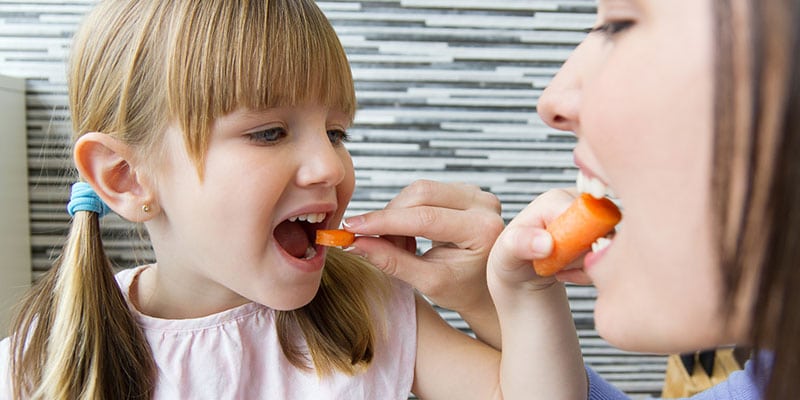Although school may look different to Ontario families this fall due to new COVID-19 protocols, what hasn’t changed is the need to provide tooth-friendly snacks to our children in order to promote optimum oral health.
Before you pack your children’s lunch box or put out a tray of afterschool munchies, consider healthy snacks consisting of meats, nuts, fruits, and vegetables that are:
• Low in sugar
• High in minerals such as calcium and phosphate to help repair tooth and gum damage
• Crunchy or need to be chewed well to help produce saliva that washes away bacteria and food particles
Planning your tooth-friendly snack menu can be fun, especially if you give the student in your life a wide list to choose from, and allow them to be involved in deciding what to take.
What are some healthy snacks for kids?
Who doesn’t love a good snack? Whether it’s for school, or to satisfy hungry children after class, providing wholesome food selections is not only crucial to protect their teeth and gums, but also to help promote overall health.
Here are some of our favourite snack time choices:
• Eggs: Eggs contain a high amount of important minerals for oral health, such as calcium, protein, and Vitamin D that help strengthen teeth and bones
• Broccoli: This green vegetable contains iron that helps to protect your tooth enamel, as well as Vitamin C and calcium to help prevent tooth decay
• Carrots: Crunchy raw carrots provide a massage for your gums when you chew it, and contains plaque-fighting keratin and enamel-strengthening Vitamin A
• Leafy green vegetables: Folic acid, found in vegetables such as spinach and kale, helps improve tooth and gum health
• Apples and celery: Both of these choices contain a lot of water and require a lot chewing to eat, which helps keep tooth surfaces clean
• Dairy: The calcium, casein, and phosphorus contained in milk, cheese, and yogurt can help protect tooth enamel, and neutralize some of the acid produced by bacteria that promotes plaque
• Nuts and seeds: If there are no concerns with allergies, these crunchy snacks contain significant amounts of calcium and phosphorus, which protect teeth by repelling acids responsible for harming tooth enamel
• Poultry: Chicken, turkey, and other protein-rich meat help support healthy tooth enamel
• Fish: Salmon, tuna, and other fish are full of vitamin D, which helps your body absorb calcium, perfect for maintaining healthy teeth and bones
Whichever snacks you choose to provide your child, be sure they sip on fluoridated water afterwards to help rinse bacteria away from their teeth. Bottled water doesn’t always contain fluoride, so it’s best to check the label or provide your children with a container of fluoridated water from your household tap
What foods are bad for children’s teeth?
Knowing which foods to avoid is just as important as knowing which foods to serve so we’re always making the best choices for ourselves and our families.
Most of us are aware of the dangers to our teeth when we eat sweets, however, some food generally considered healthy might actually be detrimental to good oral health.
For example, raisins, dried apricots, and chewy fruit snacks are often touted to be among healthy snack choices, but are actually high in sugar. On top of that, the sugar is quite sticky and not easily removed from the surface of your teeth. Eating a lot of sticky sugary food can lead to premature tooth decay.
Other sticky food that tend to stay longer in the mouth and not easily washed away include oatmeal, granola bars, and peanut butter.
As far as beverages go, sugar-filled carbonated soda pop and non-carbonated “sports drinks” should also be avoided, along with many fruit juices. The juice contained grapefruits and lemons contain Vitamin C, but are also highly acidic and can eat away at tooth enamel over time.
Also harmful to teeth are potato chips that can bond to teeth and lead to cavities, as well as white flour products such as bread, bagels, and pretzels that break down into tooth-decaying sugars.
As much as we might try, it’s hard to completely avoid sugar. Milk, fruits, and vegetables all naturally contain sugar, however they’re also filled with important vitamins and minerals that contribute to a healthy diet. The trick is to avoid food with added processed sugar, which can be harmful to teeth and lead to many other health issues such as obesity and diabetes over time.
Making healthy toddler meals
We can put our younger children on the path to healthy eating choices by offering a variety of colours, textures, shapes, and tastes that make food interesting while keeping nutrition top of mind.
You can learn a lot about your child’s preferences by offering different foods that are hot, cold, soft, smooth, savoury, sweet, bland, or spicy. Get colourful with presentation by creating faces, houses, and cars with pieces of fruits and vegetables, and use a cookie cutter to create fun, interesting shapes.
Toddlers should also be drinking fluoridated water to help keep their baby teeth and mouth as clean and germ-free as possible.
Practicing proper dental hygiene
Even when you only feed your children tooth-friendly food, they still need to follow a proper diet, brushing, and flossing routine to give their teeth their best chance of remaining clean and sparkling. Start them on a lifetime of beautiful smiles by ensuring they:
• Brush at least twice per day, especially after meals and before bed
• Floss at least once per day to remove plaque between the teeth where their tooth brush can’t reach
• Pack a small toothbrush or floss in their knapsack or schoolbag for quick touch-ups during the school day
• Keep a consistent diet of healthy, tooth-friendly food and drink as described above
• Visit your family dentist on a regular basis as recommended by your dental team
We’d like to wish all of our young patients a happy, healthy, and cavity-free school year!
Learn about tooth-friendly snacks at Yonge Eglinton Dental in Toronto
Pediatric dentistry is a passion of our team at Yonge-Eglinton Dental. If you need advice on how to promote optimal oral health in your children or want to book a routine dental checkup, give Yonge Eglinton Dental a call at 416-932-2222 or drop us a line today. We’d love to see you and your entire family!
Concerned about visiting the dentist? Read about how we protect the health and safety of our patients and staff so your family can seek proper dental care with peace of mind.





